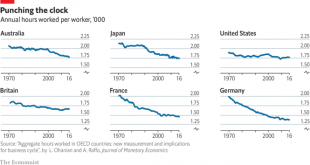Read More »
The CIS and social democracy
Readers may be familiar with the concepts of “subtweeting” and “vaguebooking”, referring to social media posts which are clearly aimed at someone in particular who is, however, unnamed. (There’s nothing specifically “new media” in this – the Oz does it pretty regularly, for example.) I’ve just had the reverse experience. An article in the Guardian by Eugenie Joseph of the Centre for Independent Studies starts out by linking to my piece on a (partially) socialist utopia, also in the...
Read More »Islam’s gift: an economy of spiritual development
from Asad Zaman My article with the title above is due to be published in the next issue of the American Journal of Economics and Sociology (2019). This was written at the invitation of the editor Clifford Cobb, as an introduction to Islamic Economics for a secular audience. The Paper explains how modern economics is deeply flawed because it ignores the heart and soul of man, and assumes that the best behavior for humans is aligned with short-sighted greed. Islam provides a radically...
Read More »Sandpit
A new sandpit for long side discussions, conspiracy theories, idees fixes and so on. Like this:Like Loading...
Read More »Weekly Indicators for January 28 – February 1 at Seeking Alpha
by New Deal democrat Weekly Indicators for January 28 – February 1 at Seeking Alpha My Weekly Indicators post is up at Seeking Alpha.There are continuing if small shifts in all of the long leading, short leading, and coincident timeframes.
Read More »Gary Becker — making nonsense out of economic science
from Lars Syll The econometrician Henri Theil once said “models are to be used but not to be believed.” I use the rational actor model for thinking about marginal changes but Gary Becker really believed the model. Once, at a dinner with Becker, I remarked that extreme punishment could lead to so much poverty and hatred that it could create blowback. Becker was having none of it. For every example that I raised of blowback, he responded with a demand for yet more punishment … Alex...
Read More »The deplorable word (updated)
Back in 2004, I wrote that There is only one real instance of political correctness in Australia today and that is that you are never, ever allowed to call anyone a racist. It’s OK to say that Adolf Hitler was a racist, and that apartheid was racist, but the idea that any actual Australian could be a racist is utterly taboo. (Update): 1. That hasn’t changed. As the comments to this post illustrate, even describing the taboo is sufficient to trigger it. 2. As is always the case...
Read More »Adani: always read the fine print
Keeping up its flow of announcements, Adani just claimed that it had received 15 000 expressions of interest in jobs at its Carmichael mine, 1500 of them from Townsville alone, “since Adani called for expressions of interest in December.” (Townsville Bulletin, paywalled) That seemed impressive, and I wondered if all those applications had actually been received since December, as claimed in the Bulletin report. After all, Adani’s “jobs portal” was set up in 2017, and has been...
Read More »Technology and Democracy (continued)
Post the Second World War, the US became dominant in the world economy and a shift from coal to oil was deliberately taken by the state to weaken the power of coal-centred industrialization and tie the Middle East into American and European control. Transport of oil by pipeline and tanker created a fluidity that tended to eliminate nodal points where workers could exercise power. Enjoy and share:
Read More » Heterodox
Heterodox


